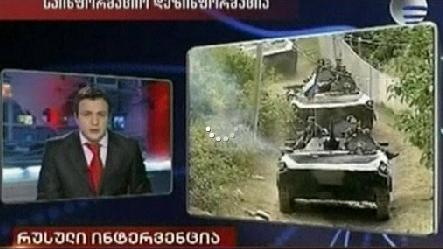
As if the actual invasion had not blown up in his face enough already, Saakashvili decided to score another own goal – this time with a virtual one.
On Saturday evening, countless Georgians saw what they believed to be news reports of a Russian invasion. What happened then resembled the aftermath of the original broadcast of HG Wells’s War of the worlds:
Mobile phone networks became inundated with panic calls and went dead’. the BBC reported. ‘Some people even started packing their bags, fearing a repeat of the August 2008 Georgia-Russia war’.
But it all turned out to be a hoax, orchestrated by ‘Imedi TV, the private, pro-government channel’, to ‘show that there was a genuine danger of a Russian invasion’.
The reason for the action was predictable and came straight out of the post-Soviet playbook – to rally the country around an external enemy, but most importantly, to discredit opposition politicians as Russian proxies.
This is something that authoritarian politicians do all the time, and the fact that Saakashvili has done it this time should not be a surprise, because for all his Westernising posturing, he remains inextricably tethered to the Soviet-apparatchik mould. Like Yuschenko, like Timoshenko, Aliev, Yanukovich, Putin, Medvedev and indeed every single other political leader of a post-Soviet state, with the possible, but not necessarily actual, exception of the Baltics.
Moreover, the fact that the stunt was broadcast on Imedi TV should immediately ring bells. For Imedi TV is the Georgian equivalent of NTV, the once-independent Russian TV channel taken over by the Kremlin.
As the BBC reports,
[Imedi TV] was once owned by Badri Patarkatsishvili, a wealthy critic of the Georgian president.
Police stormed its studios in 2007 at the height of opposition protests, sparking criticism about media freedoms since President Saakashvili’s rise to power in 2003.
Uncertainty now surrounds the ownership of Imedi TV, which is at the heart of a wider debate about freedom of speech in Georgia.
This is virtually identical to the fate of NTV, which was once owned by Gussinsky, a wealthy oligarch who eventually fell from grace and became exiled.
The point of all this is that, 20 years after the fall of the USSR, there remain no ‘good guys’ at the helm of the ensuing states, just ‘our sons of bitches’ and ‘theirs’, to use FDR’s words about Somoza.
What have Eastern European people gained from the West’s playing off one set of crooked authoritarian apparatchiks (Saakashvili, Yuschenko) against another (Putin, Lukashenka)?
Every time, the pattern is the same: we are told that they are beacons of democracy/transparency/free enterprise/entry to Europe against the nefarious pro-Russian ‘old guard’. And every time, they reveal themselves to be no different, and in many cases, worse, at least if you compare the popularity ratings of ‘democrats’ such as Yuschenko against ‘authoritarians’ such as Putin.
The latest stunt from Saakashvili should cause Western opinion makers to ponder carefully their approach towards ‘packaging’ the post-Communist states to the population at large. They should start to treat the block as a coherent whole with common problems, common heritage, and, hopefully, a common democratic destiny rather than playing them off of each other, which will only bring out the worst qualities in everyone.
Let’s have no more illusions.